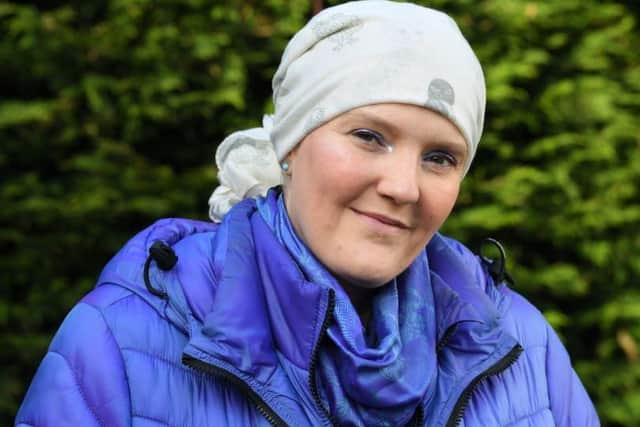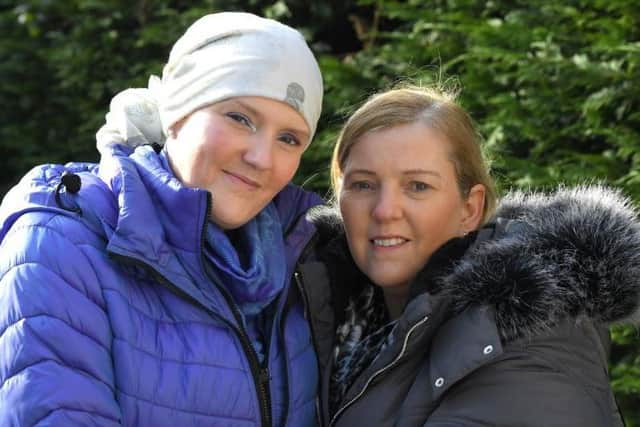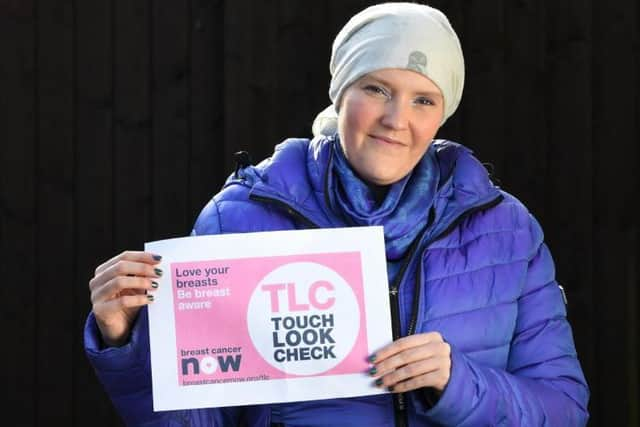'Cancer doesn't discriminate': Ingol woman battling bone cancer urges young people to get checked out
and live on Freeview channel 276
At 29, Laura was first diagnosed with hormonal fed breast cancer after weeks of scans revealed that the large 10cm mass in her breast was cancerous.
And after a mastectomy, when she was in remission from cancer last November, doctors then found evidence of another tumour in her bones.
Advertisement
Hide AdAdvertisement
Hide AdShe said that the Post's interview with Siobhan Mannion, who last week passed away aged 33 with triple-negative breast cancer, made her even more determined to encourage women to take control of their own health.


Laura, 32 said: "It is despicable that young people are often overlooked because of their age. To be told a lump is nothing to worry about because it is painful or because they are young is wrong but seems to be a recurring theme with GPs.
"When I went to my first appointment with a painful lump in my breast, I was told that it was unlikely to be anything because I was 29. I was just told that it would be dense tissue because I had big breasts.
"I was lucky enough to still be given an appointment at the breast unit at Chorley Hospital where they performed an ultrasound, a mammogram and then a biopsy."
Advertisement
Hide AdAdvertisement
Hide AdLaura was then called in again for a second opinion and was given another scan and a further biopsy to confirm the results.


It was just three days later that she got the call when she knew "straight away that something was very wrong."
She said: "I knew instantly what it was. It is so common and there are so many types of cancer but you still don't think it will ever happen to you. It is almost like they are telling you but you are dreaming and none of it is real.
"I had already mentally prepared myself for the worse news and knew something was wrong with my body. I have always kept a positive attitude though and knew that there was nothing I could do about it.
Advertisement
Hide AdAdvertisement
Hide Ad"If women could be referred from their first doctor's appointment then I think so many would have a higher chance of surviving. I think we all need to be more aware of our health because we know our own bodies best and know when something is wrong.


"It is up to us to give an expectation of what we want when it comes to our lives, but GPs need to get rid of this attitude of people being too young for cancer. Cancer does not discriminate and anyone can get it. At any time."
At the time, Laura had been working in the intensive care unit at Royal Preston Hospital and said that her clinical and medical background had helped her to process the news.
And she had tied the knot in Greece with partner Peter just a few short weeks before the diagnosis.
Advertisement
Hide AdAdvertisement
Hide AdShe then underwent agonising rounds of chemotherapy and radiotherapy before a mastectomy and breast reconstruction, taking fat and muscle from her belly and using it to form breasts.
However, during the surgery, doctors found lymph nodes which had evidence of a tumour.
And a CT scan revealed that she had a tumour in three bones in her spine and one on her right hip socket. She was told that the bone cancer was incurable.
Laura said: "It is such an insidious and unpredictable disease. The doctors think that the cancer had spread from my breasts to my bones even before I went through my first rounds of chemotherapy, but that it was microscopic so hadn't been picked up but had already begun to erode my bones.
Advertisement
Hide AdAdvertisement
Hide Ad"I am currently on treatment to stop the growth of the cancer cells in my bones but I will never be cured. I know that I will end up dying from it. I will now need to keep having regular scans for the rest of my life and continue with the treatment.
"I don't think you can ever get your head around news like that. I understand why I have it, I know how it has happened but, in my mind, I am still young, fit and completely mobile.
"I am not thinking too much in to the future, I am just focusing on what I can do now. I still enjoy life and try not to dwell too much on what will happen to me going forward."
It was her own diagnosis that spurred Laura on to make a difference, as she began supporting other people living with cancer through her work with the Macmillan head and neck cancer team last October.
Advertisement
Hide AdAdvertisement
Hide AdNow, she wants to encourage young people to seek medical help as soon as they notice any significant changes in their body or health.
She added: "I have no idea why medical professionals say that breast cancer isn't painful or that people are too young. So many young women have painful breast lumps that turn out to be cancer and it goes unseen.
"I will never, ever stop advocating for young women to check their breasts and then aggressively pursue their GP's and clinicians to be checked extensively. Women should not be dying at 33 years old after being told their lumps are not of concern.
"If I can make just one young woman trust her instincts when something isn't right then I will be happy."
Advertisement
Hide AdAdvertisement
Hide AdIt was announced earlier this month that breast cancer had overtaken lung cancer to become the most diagnosed cancer globally.
New research from the International Agency for Research on Cancer (IARC) suggested that breast cancer in women is now more common, with 2.3 million cases diagnosed in 2020.
Around 55,000 women and 370 men are diagnosed with breast cancer every year in the UK.
Dr Simon Vincent, Director of Research, Support and Influencing at Breast Cancer Now, said: “Breast cancer is the most common form of cancer in women in the UK, with around 11,500 women dying from the disease every year. This new international data is a timely reminder that breast cancer has not been paused by COVID-19, and continues to have a devastating impact on people’s lives in the UK, and around the world.
Advertisement
Hide AdAdvertisement
Hide Ad“In the UK, breast cancer was dealt a huge blow with the first wave of the pandemic having major impacts across treatment and care and now, the already strained NHS is facing immense pressures due to a significant rise in COVID-19 cases and hospital admissions. It’s now vital that the Government provides significant long-term investment in the breast cancer workforce - in particular in imaging and diagnostics - to give all women the best chance of survival."
Thanks for reading. If you value what we do and are able to support us, a digital subscription is just £1 per month for the first two months. Try us today by clicking here.